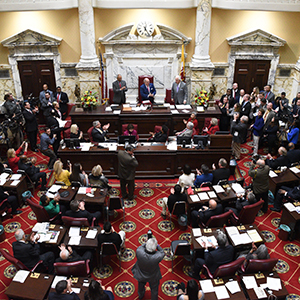 In this study, we explored whether and how state legislators use the large body of evidence around abortion and its safety when making policy decisions. We conducted in-depth semi-structured interviews with state legislators and their aides in Maryland, North Carolina, and Virginia, interviewing legislators who served on health committees and/or were sponsors or co-sponsors of abortion legislation.
In this study, we explored whether and how state legislators use the large body of evidence around abortion and its safety when making policy decisions. We conducted in-depth semi-structured interviews with state legislators and their aides in Maryland, North Carolina, and Virginia, interviewing legislators who served on health committees and/or were sponsors or co-sponsors of abortion legislation.
We found that many state legislators do use scientific evidence in a simplified form to support policy decisions on abortion legislation. However, we found most decisions are driven by politics and personal values, not evidence. Personal stories about abortion, and the views of known and trusted intermediaries such as physicians and lobbyists, were more influential to legislators than evidence. Both Democrats and Republicans accused their political opponents of basing abortion policy decisions on ideology rather than evidence, but legislators from both parties also revealed that their own abortion-related claims and priorities were driven by previously held policy preferences, rather than by evidence.
Our research suggests not just that legislators use stories because they find them more compelling than facts; they actually see evidence from science as less trustworthy, less real, than personal experience or anecdotes. Trusted intermediaries who can convey personal stories along with evidence may be valuable partners for health researchers in disseminating their evidence to policymakers. The study, “’My good friends on the other side of the aisle aren’t bothered by those facts’: U.S. state legislators’ use of evidence in making policy on abortion,” is available from the journal Contraception.
